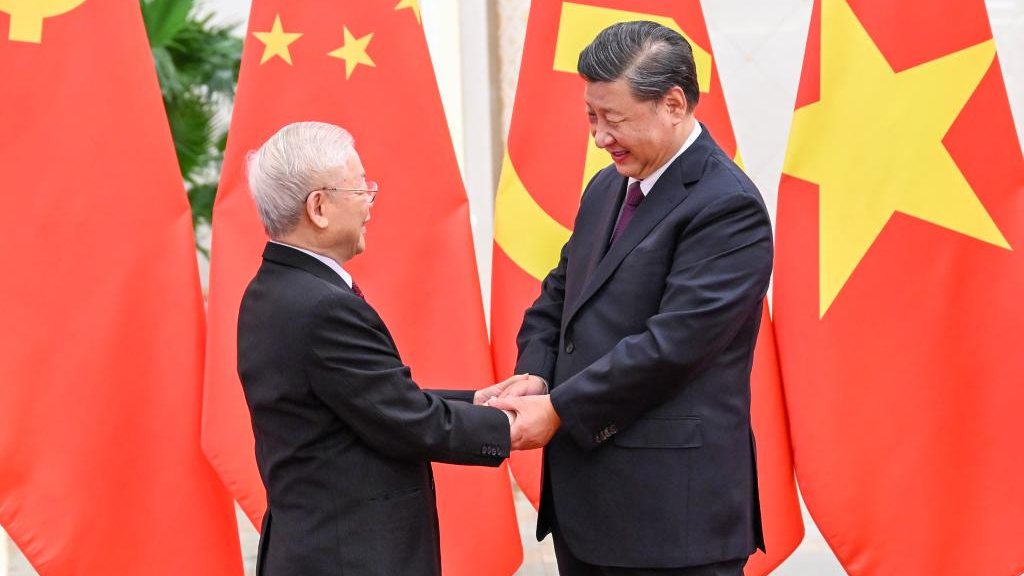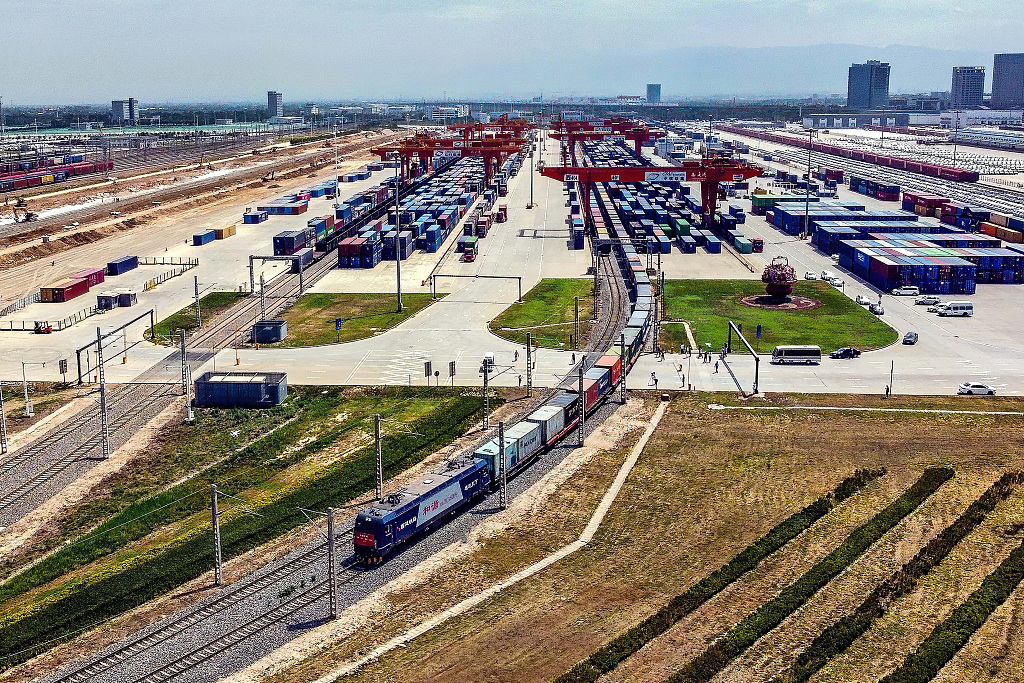
Xi Jinping, general secretary of the CPC Central Committee and Chinese president, welcomes Nguyen Phu Trong, general secretary of the Communist Party of Vietnam Central Committee, prior to their meeting at the Great Hall of the People in Beijing, capital of China, October 31, 2022. /Xinhua
Xi Jinping, general secretary of the CPC Central Committee and Chinese president, welcomes Nguyen Phu Trong, general secretary of the Communist Party of Vietnam Central Committee, prior to their meeting at the Great Hall of the People in Beijing, capital of China, October 31, 2022. /Xinhua
Editor's note: Yuan Sha is an assistant research fellow in the Department of American Studies, China Institute of International Studies. The article reflects the author's opinions and not necessarily the views of CGTN.
General Secretary of the Communist Party of China (CPC) Central Committee and Chinese President Xi Jinping welcomed General Secretary of the Communist Party of Vietnam (CPV) Central Committee Nguyen Phu Trong in Beijing on October 31. Trong is the first foreign leader to visit China since the 20th CPC National Congress, and it's also his first official trip overseas since he was re-elected as General Secretary in the 13th CPV National Congress in January 2021, demonstrating the solid friendship between China and Vietnam.
China-Vietnam friendship runs deep
This event highlights the special status of Vietnam in China's foreign relations. The two countries have maintained deep political, economic and cultural ties.
Politically, China and Vietnam as fellow socialist countries have long been each other's "comrades and brothers" with shared common aspirations in pursuing socialist modernization, and have delivered impressive economic growth and political stability in their own paths. The two countries have engaged in close contact since the normalization of diplomatic relations in 1991, which has developed into a comprehensive strategic cooperative partnership.
Economically, the two countries have been close trading partners owing to the economic comparative advantages, geographic proximity and close diplomatic relations. China has been Vietnam's largest trading partner and important source of foreign direct investment. Despite COVID-19 disruptions, the bilateral trade continued to grow and reached $230.2 billion in 2021. With expanding domestic market of both sides, two-way trade would have greater prospects in the coming years.

A China-Vietnam freight train pulls out of Xi'an international port in Xi'an, northwest China's Shaanxi Province, August 23, 2022. /CFP
A China-Vietnam freight train pulls out of Xi'an international port in Xi'an, northwest China's Shaanxi Province, August 23, 2022. /CFP
Culturally, the two countries share deep roots and cultural affinities. People-to-people ties remain strong and vibrant. More importantly, the two countries, heirs to Confucianism, highly value harmony in inter-personal, as well as inter-state relations.
China-Vietnam relations enter a new stage
The two sides have forged close relations based on mutual respect, mutual interest and mutual trust. The top-level meeting between the two party leaders laid the foundation for deepening bilateral ties.
During the meeting, Xi awarded a friendship medal to Trong, demonstrating that China treasured its friendship with Vietnam. The two leaders pledged to deepen bilateral relations on the principles of "long-term stability, future-oriented thinking, friendly neighborliness and comprehensive cooperation," carry out the spirit of "good neighbors, good friends, good comrades, good partners," and consolidate traditional friendship, strengthen strategic communication, enhance political mutual trust and properly manage disputes, in an effort to promote the China-Vietnam comprehensive strategic cooperative partnership to a new stage.
The two leaders also presided over the signing of bilateral cooperation documents on various areas ranging from politics, economy and trade, environmental protection, culture and tourism, jurisdiction, customs and local issues. Such pragmatic cooperative efforts are in the best interest of the two countries. China welcomes the fast socioeconomic development of Vietnam. The country also makes it a priority to cultivate a stable bilateral relationship with China for the realization of its goals over the next five years set at the 13th VPC National Congress.
China-Vietnam cooperation injects stability and vitality into the region
The cooperation between China and Vietnam would inject much-needed stability and vitality against the increasingly uncertain world.
As two economic engines in Asia, the sustained growth and economic cooperation between China and Vietnam can revitalize the anemic global economy, which is afflicted by an unabating COVID-19 pandemic as well as global food, energy and supply chain disruptions.
As two developing countries standing for sovereignty and independence, the bilateral cooperation would serve as a bulwark against imperialism in the region. General Secretary Trong pledged that Vietnam adheres to the one-China principle and opposes any form of secessionist activities of Taiwan separatist forces. Despite having maritime disputes in the South China Sea, the two countries are better managing the differences peacefully.
As two essential players in Asia-Pacific, the cooperation between the two countries is also conducive to regional integration. President Xi said that China values the status and role of Vietnam in Association of Southeast Asian Nations (ASEAN), and looks forward to joining hands with Vietnam to build a peaceful, tranquil, prosper, beautiful and friendly family in East Asia. The two countries pledge to cooperate under the China-ASEAN framework, as well as emerging regional institutions such as the Regional Comprehensive Economic Partnership, the Mekong-Lancang Cooperation and the Belt and Road Initiative.
(If you want to contribute and have specific expertise, please contact us at opinions@cgtn.com. Follow @thouse_opinions on Twitter to discover the latest commentaries in the CGTN Opinion Section.)